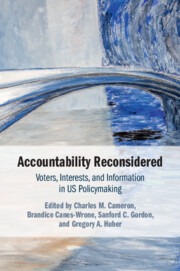4 - Logic with Polarized Parties, Changing Media, and Motivated Reasoners
- from Part I - Candidate Evaluation and Selection
-
- Book:
- Accountability Reconsidered
- Published online:
- 09 February 2023
- Print publication:
- 16 February 2023, pp 68-88
-
- Chapter
- Export citation
6 - Local Newspapers and Ideological Accountability in US House Elections
- from Part II - The Media and The Informational Environment
-
- Book:
- Accountability Reconsidered
- Published online:
- 09 February 2023
- Print publication:
- 16 February 2023, pp 129-149
-
- Chapter
- Export citation
3 - Can Citizens Assess Policies Based on Programs’ Costs and Benefits? The Role of Yardsticks and Contextual Information in Democratic Accountability
- from Part I - Candidate Evaluation and Selection
-
- Book:
- Accountability Reconsidered
- Published online:
- 09 February 2023
- Print publication:
- 16 February 2023, pp 42-67
-
- Chapter
- Export citation

Accountability Reconsidered
- Voters, Interests, and Information in US Policymaking
-
- Published online:
- 09 February 2023
- Print publication:
- 16 February 2023


